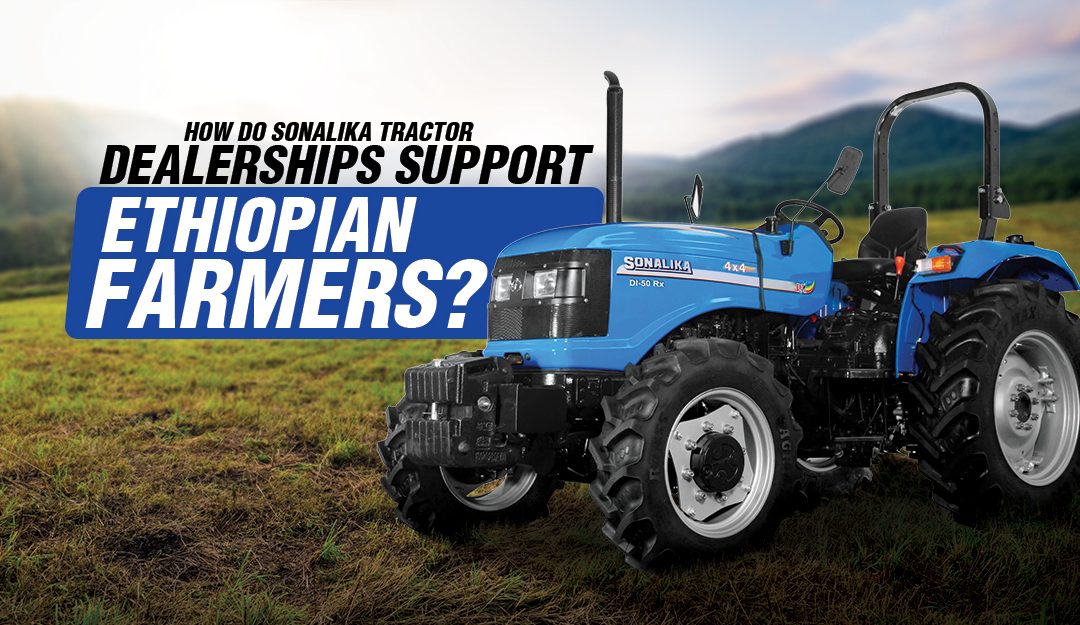
How Do Sonalika Tractor Dealerships Support Ethiopian Farmers?
The major source of income for Ethiopian people stems from agricultural activities since their nation is mostly covered by agricultural regions. Smallholder farmers struggle in their operations because they cannot access modern equipment in their work environment, which combines scarce equipment availability, unpredictable weather conditions, and minimal mechanization practices. Sonalika Tractors operates a global production facility that manages essential distribution channels focused on agricultural development across all regions of Ethiopia. Sonalika, through its dependable tractor machinery and farming techniques plus extended help, enables Ethiopian farmers to enhance their efficiency while increasing their crop output.
Bridging the Mechanization Gap:-
Mechanizing agriculture needs to happen because it generates higher output and eliminates extensive agricultural tasks. The present farming methods in Ethiopia depend on manual work alongside ploughing with animals, resulting in reduced efficiency and constrained agricultural output. Sonalika dealerships solve this challenge by selling specialized, high-quality, affordable tractors designed for Ethiopian farmers. The tractor selection at Sonalika includes lightweight models and heavy machinery that allow farmers to find the optimum equipment to match their farming operations. The farming sector within Ethiopia finds these tractors highly beneficial because they feature strong engines with excellent fuel economy and reliable construction.
Affordable Financing and Leasing Options:-
Modern tractor acquisition remains too expensive for Ethiopian farmers who want to mechanize their farming operations. Sonalika dealerships join forces with financial organizations to develop flexible financing packages that aid farmers in owning equipment. Sonalika dealerships help farmers with financing options to afford tractor purchases.
After-Sales Service and Spare Parts Availability:-
Farmers who purchase tractors worry about the availability of tractor spare parts and dependable maintenance services. Through its Ethiopian dealership network, Sonalika provides speedy service and maintenance to agricultural machinery users, thus maintaining tractor efficiency. The reliability of spare parts supply no longer concerns farmers because they can access parts from reliable Sonalika dealerships. Maintenance teams based at dealerships offer prompt repair services to stop essential farming equipment from breaking down at resourceful times.
Customized Solutions for Ethiopian Farming Needs:-
The needs of farming in Ethiopia differ according to the landscape types, farming methods, and climate conditions. These different requirements demand customized tractor models with attachments, which dealerships provide to their customers. Sonalika dealerships enhance agricultural output for Ethiopian farmers by creating specialized solutions for their needs.
Training and Capacity Building:-
The simple supply of tractors does not meet farmers’ needs since they require sufficient skill for effective tractor operation. The Sonalika dealership network establishes training workshops and demo sessions that share agricultural knowledge with its customers. Sonalika dealers deliver training programs that educate tractor operators and farmers about efficient tractor operation, which cuts down fuel usage and raises the rate of agricultural production.
Boosting Rural Employment and Economic Growth:-
The existence of Sonalika dealerships produces beneficial effects on rural employment numbers alongside economic growth rates. They are spread across Ethiopia, producing job opportunities and economic development in rural areas. Local service personnel together with sales representatives and technicians receive employment after dealerships establish operations in rural areas. Sonalika tractor adoption advances agricultural productivity thus farmers receive better incomes while food security improves. The farming method enables farmers to work in smaller teams over greater areas for amplified profits that boost their standard of living.
Conclusion:-
Sonalika dealerships transform the agricultural industry by delivering essential tractor services, including equipment access, funding support, maintenance assistance, and operations training for farmers. Sonalika’s widespread support enhances farm productivity and has positive effects on rural development and economic expansion in Ethiopia. Sonalika’s commitment to supporting mechanization and empowering farmers will set the course for Ethiopian agriculture toward a better, sustainable, and prosperous agricultural future.

